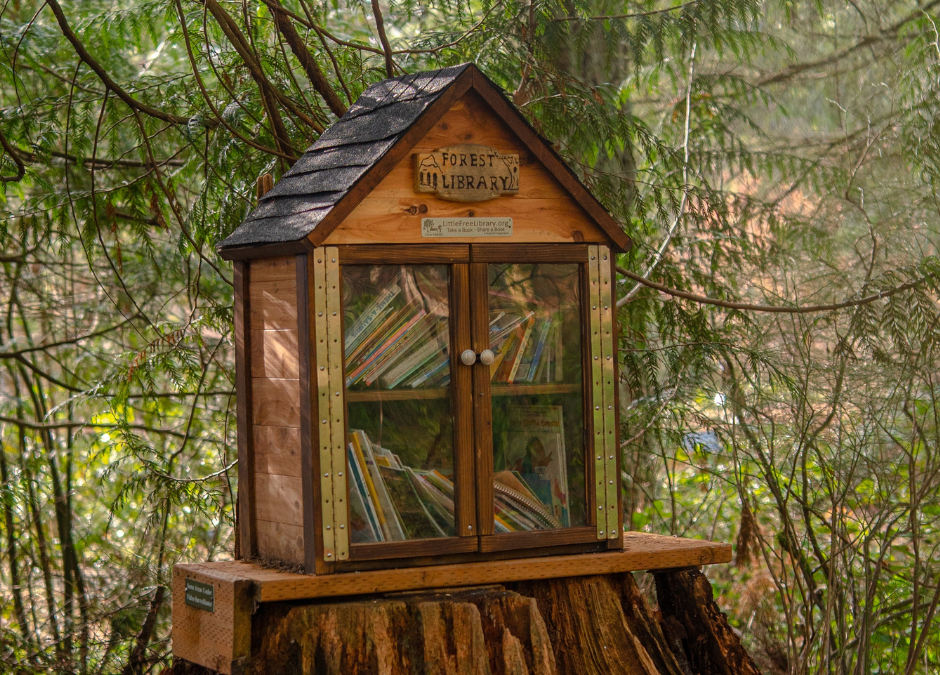Have you ever gone for a walk and come across a charming mini-library on the edge of the street?
I recently visited Seattle and would take a couple of walks a day with my sister and her dog, allowing me to take in the beautiful scenery away from the mountains and coast. Each house was different, some had a unique and colorful garden filled with native and non-native plants, and some had walls of ivy; what really stuck with me was that every few houses were an adorable little free library brimming with books for all ages. While I’ve seen little free libraries here and there on the east coast, I had never seen quite so many within a 2-mile radius. As a visitor, even I could feel these neighbors’ strong sense of community.
So, I decided to build my own and put it in my front yard here in Maryland.
Why build a little free library?
Little free libraries are an easy and creative way to get more connected with your community and your neighbors. The slogan of each is to “Take a book. Share a book.” The Little Free Library organization aims to encourage community-building, inspire readers, and make books more accessible for all, thanks to a global network of 100,000+ volunteer-led book exchanges.
The pandemic and the prevalence of environmental crises have irrevocably altered how our world functions; for the most part, we have shifted towards a more isolated society. In today’s world, it’s rare to see kids playing in the streets and neighbors to be out in their yards talking to one another. Due to our fears, most of us tend to stay indoors or keep to ourselves instead of getting to know the other people living around us. These mini libraries are a great way to connect with the strangers who live next door as they stop to peruse the selection of books in your front yard.
These libraries not only unite neighborhoods and communities, they also promote literacy and combat censorship. In the United States, less than 50% of US adults read above an 8th-grade level. On a more general note, with the rise of technology, only a small percentage of adults make time to read on a regular basis. While a mini library in someone’s front yard may not magically remedy this, it is a great way to promote reading and give people opportunities to grab a book they otherwise wouldn’t have.
Not to mention, little free libraries are a sustainable way to broaden your book horizon. Not only are you recycling books instead of buying new ones, you’re also coming across books you’ve never heard of or genres you’ve written off. Who knows, maybe a little free library is the gateway to a community book club!
You don’t have to stock your library exclusively with books; some libraries offer packets of native wildflowers and plants for others to pick up and plant in their own yards. Pollinator Week is currently ongoing. The Pollinator Partnership created and oversees this annual event to raise awareness of pollinator health. This year’s celebration focuses on the connections between climate and pollinators; pollinators are at serious risk as their food and homes are deteriorating as temperatures and natural disasters are increasing. Planting pollinator-friendly native plants is a simple and effective way to help your local pollinators.
Want to build one?
If you’d like to put a little free library in your neighborhood, there are many ways you can do this! The Little Free Library organization provides a wide range of libraries; you can find ready-to-use libraries and do-it-yourself kits to build one yourself. Or, you can do what I’m doing; build a new one from scratch. Doing this allows for complete control over size, shape, number of shelves, layout, and more! I’m currently in the planning stage of this project, workshopping and figuring out a layout that works for me and my family. I’ll be using scrap lumber and exterior plywood we have lying around.
As for design, the world is your oyster. There are countless ways you can decorate, paint, or stain your little free library. It’s entirely up to you (and possibly your HOA)!
Once you’ve set it up, don’t forget to purchase a “Little Free Library” official charter sign and register your library on the map of libraries. This plaque also gives you access to a private Facebook group for stewards and an e-newsletter filled with inspiring stories and ideas.
We at OneNature believe a strong sense of community and interconnectedness is a cornerstone for a happy and healthy life. Community wellbeing is an essential component of all OneNature projects and programs. We believe that without a thorough understanding of and commitment to community wellbeing, conservation initiatives will fall short of their goals of halting the extinction crisis, ensuring environmental sustainability, promoting social justice, and fostering human flourishing in communities that are responsible for protecting the world’s remaining wildlife and wild places. A strong sense of community is paramount in order to achieve this.
If you decide to set up a little free library, let us know. We would love to see pictures of your process or final product!
Image by Bryan Anderson
